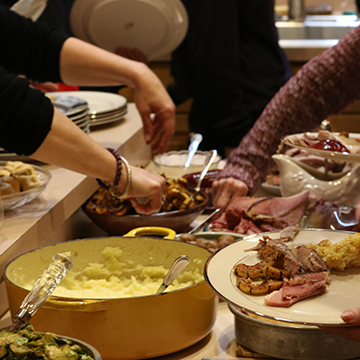As someone who has struggled with disordered eating and binge eating, events like Thanksgiving were incredibly challenging.
Leading up to the meal, I’d obsess over the foods we would have, what I would eat, and how I’d justify it (i.e. the Turkey Trot race). By the time we sat down to eat, I was anxious, overwhelmed, and I’d end up bingeing. I’d spend the rest of the night wishing I could turn back time, and I’d wake up the next day still full and disgusted with myself.
Years later, through trial and error, I’ve landed on some tools that helped me break the cycle, prevent binges, and actually enjoy holidays:
1. Set yourself a guideline and stick to it.
Holidays and parties contain a lot of unknowns. What will be served? What should I eat? With so much up in the air, we’re overwhelmed and end up making choices we regret.
One method for calming the anxiety is to set a guideline. Find something concrete you can stick to, and you’ll regain control of the situation.
Here’s one that works for me: one plate per meal. One for dinner, one for dessert, then that’s it. I can fill my plate with as much as I want, with whatever foods I want, but when it’s empty, I don’t go back for more.
I follow this because when I got up for seconds, I always wished I hadn’t. And more often than not, the second dessert plate turned into a third, then a fourth, then me standing in front of the buffet table picking at the remainders, for the next hour. A binge.
Sticking to one plate ensured I could enjoy all of the foods I was looking forward to without feeling uncomfortably full.
I might add to my guideline, too. Maybe I’ll only have the pumpkin cheesecake for dessert because I know I’ll want to enjoy a big slice, no matter how many pies my aunt unexpectedly brings from the bakery by her house. (True story. Even when she didn’t attend one year, I’m pretty sure one of those pies still found its way into my parents’ freezer.)
I can always have pie the next day, anyway.
Maybe this’ll work for you, or maybe you have another method in mind. Choose something you can stick to, that doesn’t deprive you, but will make you proud at the end of the day.
2. Don’t show up ravenous.
I’m not saying you should eat a big meal right before the party, and I’m not saying you shouldn’t feel any hunger at all.
I’m talking about what doesn’t work: intentionally restricting yourself in the hours and even days leading up to the meal. “Saving” your calories so you can have dessert. Not eating all morning because you’re afraid you won’t be hungry for the main event.
Here’s what I’ve learned: this method backfires, every time.
For one thing, you’ll spend all morning anticipating the meal. Since you’re so hungry, it’s all you can think about. When the time finally comes to eat, your body will be so deprived that it will demand you inhale everything in sight, as quickly as possible.
You’ll pile far more on your plate that you would have otherwise. You’ll find yourself physically incapable of slowing down and eating mindfully (you won’t pay attention to the taste, texture, and experience). You’ll be finished in a matter of minutes and will very likely get up and get more, especially because everyone else is probably still eating, and you won’t know what else to do, since all you can focus on is food.
The company, the conversations – all of it is irrelevant, overshadowed by your body’s primal urge to replenish what it’s been deprived of for so long.
The result? You’ll likely end up overeating, which is the very scenario you were trying to avoid.
The solution? Eat as you would normally eat throughout the day. So you’re still hungry when dinner time comes, but not so ravenous that it takes over your every thought and action, and takes away from the experience of spending time with family and friends.
3. Eat slowly.
If you follow number 2, this one becomes exponentially easier. Now that you’ve shown up hungry but not ravenous, you can focus on enjoying your meal slowly and mindfully.
Chew for a few seconds longer than you normally would. Rotate among foods on your plate. Put your fork down between bites. Look around the table and make eye contact (this is important; it grounds you, brings you back to the present). Listen to whoever is speaking and add to the conversation. Drink water occasionally. Bust out your DSLR and take pictures of your half eaten food (see above).
Not only will this give your body a chance to tell your mind it’s satisfied before you’re uncomfortably full, it’ll draw the meal out into a longer experience. Rather than all of the anticipation disappearing in the three minutes it takes you to eat if you’re starving, you can enjoy your meal for much longer.
So: 1. set a guideline, 2. don’t show up starving, and 3. slow down. You’ll be much less likely to overeat, and you might actually enjoy all that time spent with your crazy extended family.
If you relate to these experiences with family parties and disordered eating and have any tips of your own to share, or if you have any questions or want to talk about it further, please send me a message! It’s not easy, but it’s so freeing once you’ve overcome the challenge.
Have a happy and safe Thanksgiving!
